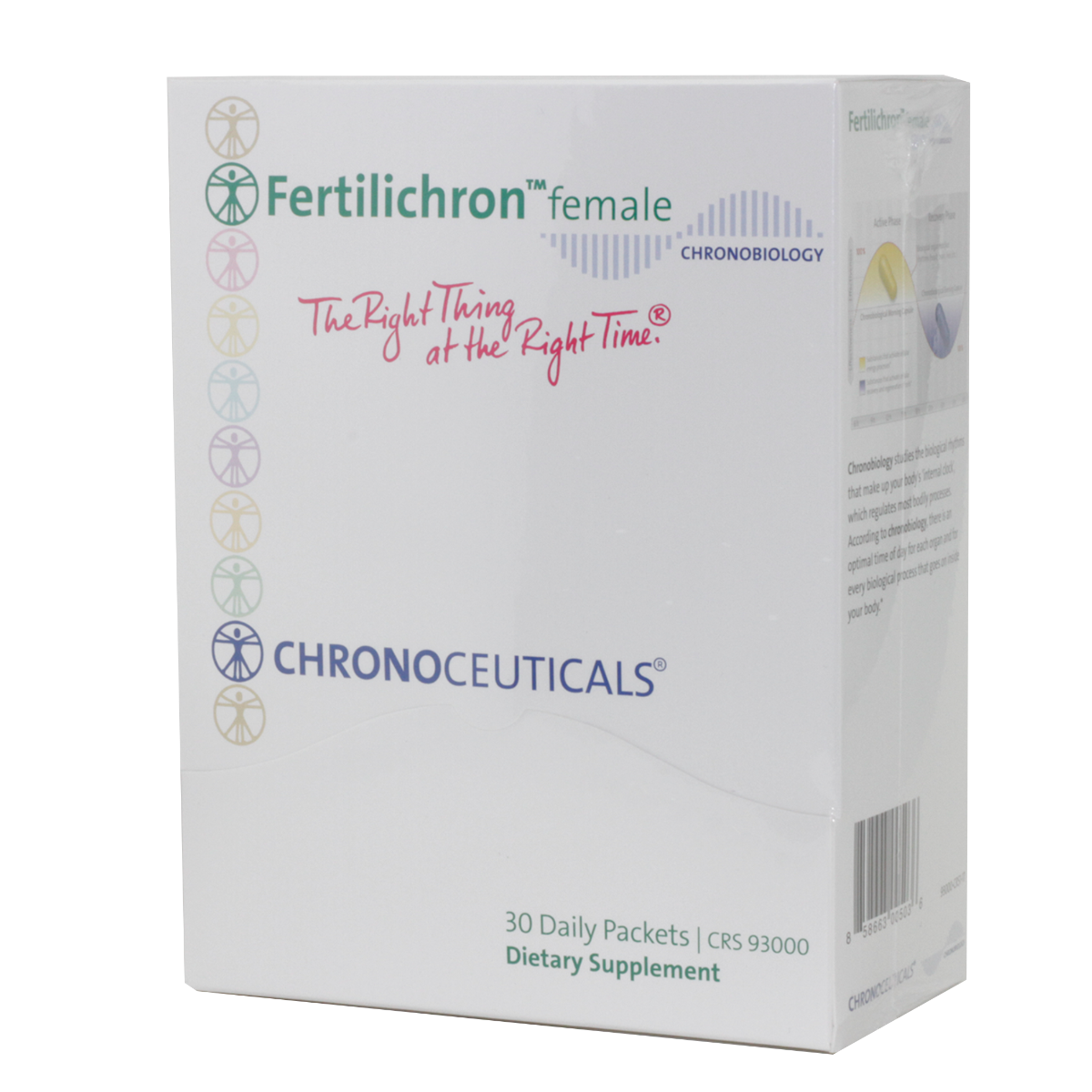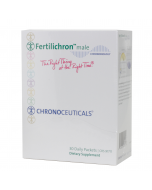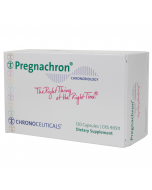Basics
The Mayo Clinic defines female fertility as a woman’s ability to get pregnant. As much as 50 percent of the time, problems conceiving can be attributed to physical causes in the woman, and another 20 percent of the time it can be attributed to causes in both the woman and the man. Approximately one in every six couples of childbearing age encounters obstacles during their first attempt at pregnancy. Before age 30, a woman’s chance of becoming pregnant during any given cycle is about 20 percent; a figure that drops drastically after age 35, falling to a mere 5 percent after age 40. Technically, a couple is officially classified as infertile if pregnancy does not occur within one year of having unprotected sex. Unfortunately, the longer a couple has been infertile, the more difficult it is to provide effective treatment.
Many different factors can affect female reproductive health and fertility, including hereditary conditions, hormonal imbalances, irregular menstrual cycles and/or ovulation, endometriosis, conditions like PCOS (Polysystic Ovarian Syndrome), and biological age. Certain nutrients play an important role for women who wish to become pregnant, because they can help support healthy hormonal balance and a healthy female reproductive system in general.
Female fertility reaches its climax in the early twenties and, according to the latest findings, begins to decline around the age of 30, and even more significantly after the age of 35. By age 35, the number of egg follicles (present in the woman’s body since birth and dormant until puberty) will have shrunk to only 12 percent of the original quantity, decreasing further to just over three percent by the age of 40.
This means that only three out of four, or 75 percent, of all healthy 30-year old women who wish to conceive will get pregnant within one year without artificial intervention. This percentage drops to 66 percent of healthy 36-year olds, and only 44 percent of healthy 40-year old women. Additionally, while only nine percent of pregnant women miscarry at age 20, this figure increases to over 50 percent by age 42.
In August 2013, the US National Center for Health Statistics in Hyattsville, Maryland released some surprising figures. Their latest findings reveal that there are different development trends which relate to a woman’s ability to get pregnant and to her wish for a successful delivery.
In a survey including 12,279 married women and men ranging to age 44, the number of women with fertility disorders has actually decreased from eight and a half percent in 1982 to just six percent in 2010. Women are considered infertile when sex at least once a month for twelve consecutive months without contraception does not lead to pregnancy. While fertility increased, at the same time, the percentage of pregnancies with serious problems or an undesirable outcome rose from 11 percent (1982) to 15 percent.
It’s hard to pinpoint definitively why one trend was positive and the other negative. Influencing factors may be a woman’s age at the time of getting married and at the time of first delivery, but sexually-transmitted diseases, environmental toxins, lifestyle factors such as being overweight, or the impact of the pronounced increase in infertility treatments might be factors. Neither the financial status nor the educational level of the women was found to have a statistical effect.
The impaired fertility characterized by severe pregnancy problems was shown clearly to be age-dependent; when compared to the group of women aged 24 to 44 years, only half as many women in the age 24 and under age group were affected. When planning for a child, an important conclusion that can be drawn from this information is to take advantage of the time span available for optimizing all key parameters.
While many factors which affect fertility are out of our control, it is possible to support optimal female fertility levels by addressing those lifestyle factors that are within our control. These include engaging in a moderate level of physical activity, maintaining a healthy weight, monitoring prescription drug use, and curbing habits like smoking and excessive alcohol consumption.
Perhaps the most important contributor to healthy fertility is diet and nutrition. Nourishing your body and reproductive organs with the proper vitamins, minerals and nutrients is one of the most important steps you can take to support optimal reproductive health, and is absolutely essential for a healthy pregnancy and for the health of your baby-to-be.
Since healthy fertility depends on several factors, a responsibly-designed supplement regimen must include a variety of amino acids, vitamins, plant extracts and trace elements. The aim is to use the period of time preceding conception to optimize all relevant parameters, so that when conception finally takes place, the eggs are of satisfactory quality and all other preconditions for a successful pregnancy are also fulfilled. There is a better chance that the maternal and paternal gene pools will be successfully combined when as many components for a successful fertilization and subsequent implantation as possible are stimulated and optimized by natural means.
The interaction of all pertinent ingredients, combined in a scientific formula based on chronobiological principles, can support a healthy female reproductive system and fertility naturally.
Effects
When it comes to fertility-supporting micronutrients, selecting the optimal dose as identified in scientific studies is a decisive factor. Another important factor in achieving successful conception is to consider the chronobiological needs of the female body, which can be done by administering a variety of activating substances - perfectly attuned to one another - in the morning hours, followed by regenerating substances in the evening hours.
Fertilichron® female is a scientifically-formulated blend of plant extracts, amino acids, vitamins, and minerals developed in accordance with the principles of chronobiology to promote a healthy female reproductive system and support optimal fertility.
Myo-inositol belongs to the comprehensive vitamin B complex. As a key component of the cellular membrane, inositol is an important bioactive substance when it comes to maintaining normal cell growth and healthy insulin production. This B vitamin supports the mother-to-be’s healthy brain metabolism and promotes proper production of the “happiness hormone” serotonin – a real gift for every woman undergoing the strains and stresses of pregnancy.
Studies reveal that during the three months prior to fertilization a higher myo-inositol level in the follicular fluid is a factor that relates to improved egg quality. Many women already appreciate the positive effect inositol has on the skin, but this vitamin is also highly beneficial for the rest of the body.
L-arginine is an amino acid that supports healthy blood flow to the reproductive organs, helping to create optimal conditions for the implantation of an embryo. L-arginine also supports the healthy formation of protein-like mucus in the uterus.
Folic acid is one of only few micronutrients known to prevent developmental disorders in the posterior part of the embryonic spine. It is crucial, however, that at the time of fertilization the woman’s body already contains a sufficient amount of folic acid, because it plays an essential role right from the start of pregnancy. Folic acid deficiency during the last months of pregnancy also increases the probability of a miscarriage. The bioavailability of the folic acid in Fertilichron® female assures optimal efficacy.
Natural Carotenoids (beta-carotene, lutein, lycopene) provide the female body with a precursor to vitamin A. The first letter of the alphabet is dedicated to this vitamin for a good reason, as it fulfills important tasks related to human reproduction, cell division and growth. Beta-carotene, the precursor to vitamin A, belongs to a group of substances which primarily support a healthy immune system. Due to their great antioxidant potential, carotenoids are generally classified as powerful protective substances which help protect against free radicals. The human body uses beta-carotene to produce the exact amount of bioactive vitamin A needed at any given time, making an overdose unlikely.
The medicinal root maca was used by the Inca kings to boost sexual energy and appetite. Even in the early millennia of civilization, healers devoted much time and energy to addressing sexual concerns, and often resorted to the treasure trove of natural remedies. Macaplex® (Lepidium meyenii root extracts), the patented maca extract with a mixture of active substances, contains a wide variety of minerals, essential amino acids, and trace elements. This potent extract not only boosts libido – it also helps support healthy overall hormone balance; the first step for a healthy and optimally-functioning female reproductive system. In addition, Macaplex® enhances physical and mental energy, while also supporting a healthy immune system.
The special tomato molecules in Fruitflow® (tomato extract) were shown to produce convincing results in seven scientific studies, and were the very first botanical substances to be acknowledged by the European Food Safety Authority (EFSA) for their desirable health benefits. When trying to conceive, the challenge is to ensure optimized blood flow during this period of peak demand. There are three factors which generally contribute to poor cardiovascular health: an improper blood lipid ratio, hypertension, and the dangerous accumulation of platelets.
The tiny disc-shaped platelets play an important role in blood clotting. When a blood vessel gets damaged, they gather on the inside of the wound to seal and protect it. Stress, being overweight, and LDL cholesterol may cause the platelets to become too sticky, which is dangerous. The constituents in in Fruitflow®, derived from the substances with which tomatoes cover their seeds, help keep the platelets smooth without affecting their blood-clotting properties.
The EFSA became convinced of the desirable effect of these special substances after implementing a highly-sophisticated testing method. In the study, 27 men and women ranging in age from 40 to 65 ingested either a powdered tomato extract or a placebo, then vice versa. Concurrently, they agreed to have blood withdrawn through permanent cannulas at intervals over a period of seven hours. Every hour, 20 milliliters of blood were taken for analysis.
The test started at 7 a.m. Only 90 minutes later the group that had taken the tomato extract showed an improvement in their blood, whereas the placebo group didn’t. This positive effect on the blood lasted for 18 hours.
This outcome prompted the EFSA to approve the following official statements: “Fruitflow helps to keep platelets in a healthy condition and thereby contributes to an improved blood flow,” and “Fruitflow supports cardiovascular health.”
In 2011, these special tomato substances were honored with the international “NutrAward”.
Fruitflow® is an important ingredient in the morning dose of Fertilichron® female.
Coenzyme Q10, a coenzyme involved in a variety of biological processes, also plays a key role in the successful fertilization and implantation of the woman’s eggs. Thanks to the latest developments and the use of high-quality raw materials, both bioavailability and efficiency of this ingredient have been greatly enhanced.
The polyphenol resveratrol is a natural, highly-efficient nutrient. It is extracted from the skin of grapes, and has been shown to have high antioxidant potential. Not only does resveratrol help protect against reactive oxygen molecules; it also helps maintain the mother-to-be’s cardiovascular health, especially by promoting healthy cholesterol levels already within normal ranges. Resveratrol is also beneficial to the unborn baby as it supports many cellular processes and functions.
Prophylactic administration of a balanced combination of vital vitamins, minerals and essential trace elements in the pre-pregnancy period provides the female body with all the substances it will need in larger amounts during pregnancy and breast-feeding. The supplement Pregnachron®, which has been specially-developed for pregnant and breast-feeding women, is included in the morning and evening Fertilichron® female packets, and assures that all vital substances needed during these stages of life are chronobiologically attuned to each other. At a later stage, these substances will be passed on from the mother to her baby.
Here is an overview of Pregnachron’s most important ingredients:
Vitamin C, also known as ascorbic acid, is a water-soluble vitamin whose important function is to protect tissue structures, cell membranes and cell components such as proteins and enzymes from oxidative damage from free radicals. The risk of this damage is especially pronounced in times of increased metabolic activity, as occurs during physical strain, disease, and pregnancy.
Vitamin E (as D-alpha tocopheryl acid succinate) also serves to protect the body from oxidative stress and to help heal damage that has already occurred. This fat-soluble substance is found mainly in cell membranes, where it supports the active properties of vitamin C.
Natural carotenoids, which have been touched on above, are an additional class of fat-soluble nutrients with antioxidant properties that serve as natural coloring agents in plant-based foods. The graduated and coordinated action of several antioxidants is needed to optimally protect the body from oxidative damage.
Vitamin A (as beta-carotene), also mentioned above, has several effects including supporting the growth and differentiation of monolayer or multilayer tissues and of bone mass, support of placental and embryonic development, and supporting a healthy immune system.
The various substances of the vitamin B complex serve as important components in several enzymes which initiate key processes in metabolism. States of deficiency occur mainly at times when the body needs larger quantities of this substance, for instance when the rapidly-growing embryonic tissue during pregnancy requires a high turnover of nutrients.
Vitamin K1 is needed in the liver for the formation of several coagulation factors. A vitamin K deficiency may cause dangerous hemorrhage in the infant during delivery. At the same time, vitamin K deficiency also appears to be associated with a higher rate of miscarriage, especially during the first days following conception.
Vitamin D3 (as cholecalciferol) promotes the intestinal absorption of calcium and phosphate from food, facilitates the activation of both of these substances in bone, enhances mineralization, and helps maintain the required calcium levels in blood by increasing the absorption of calcium from food and minimizing its loss through the kidneys.
MCHC®, or microcrystalline hydroxylapatite calcium, is an exceptional substance. Hydroxylapatite forms the foundation of the hard substance of all vertebrates, including humans. It makes up 40 percent of bone and almost 100 percent of tooth enamel. In addition to calcium and phosphate, MCHC contains all minerals required for healthy bones, in the proper ratios. The special microcrystalline form of administration allows optimal absorption, helping to prevent a state of deficiency in the developing infant that could lead to skeletal deformation. A healthy calcium balance is also needed to assure that the fertilized egg implants into the lining of the uterus, resulting in pregnancy.
Like folic acid, Biotin is a co-enzyme involved in several metabolic processes. The need for this co-factor is very high during the days leading up to pregnancy and during the entire period of pregnancy and lactation.
Important minerals and trace elements such as magnesium, copper, zinc, iodine, iron, selenium, manganese, chromium and molybdenum as well as omega-3 fatty acids are also included in Pregnachron. It’s important that iodine, selenium, calcium and other bone nutrients are stored in sufficient quantities in the female body at the time of fertilization and before the formation of the placenta.
Iodine deficiency is regarded as one of the most common causes of developmental disorders during pregnancy worldwide. Magnesium deficiency, in turn, plays a role in many pregnancy complications. Minerals and chemical elements, such as molybdenum, support the effectiveness of amino acids and enzymes, especially when they are administered together in the correct chronobiological combination.
Omega-3 fatty acids are needed by the body for many diverse, vital functions. They are key components for healthy fetal brain development, are indispensable for the formation of healthy nerve cells, and are an integral component of the cell walls. Omega-3 fatty acids also help maintain healthy blood flow, thereby supporting the maintenance of healthy blood pressure within normal ranges. They also support healthy blood lipid levels already within normal range, and are among the most important vital substances for cardiovascular health. Among the most important essential fatty acids are DHA and EPA. They cannot be produced by the body and therefore must be obtained from an outside source such as food or supplementation. If they are present in sufficient quantities before a woman gets pregnant, the probability of a successful pregnancy is much higher.
Uses
Fertilichron® female supports ideal conditions for healthy fertilization, promotes optimal egg quality, supports normal hormone balance and, in general, encourages healthy female fertility.
The intelligent interaction of the ingredients in Fertilichron® female benefits the entire reproductive system, helping to prepare the body for pregnancy with a specially formulated selection of bioactive vital substances. Maintaining proper levels of vitamins and minerals also promotes regular production of the body’s own “happiness hormone,” serotonin, which can aid in mental preparation for pregnancy as well.
Additionally, the chronobiological administration of over three dozen high-quality ingredients promotes healthy female fertility by helping to protect against certain reproductive concerns.
Supplement Facts
Supplement Facts AM (Morning)
Per Serving
Daily Dose
Daily Value
1 AM Fertiliplex® Female Capsule [Yellow/White]
Macaplex® (Lepidium Meyenii Root Extracts)
300 mg
300 mg
†
Fruitflow® Tomato Extract
150 mg
150 mg
†
Myo-Inositol
50 mg
50 mg
†
L-arginine (as L-arginine HCl)
50 mg
50 mg
†
2 AM Pregachron® Capsules [Yellow]
Vitamin A (as Beta Carotene)
750 mcg RAE
1500 mcg RAE
167%
Vitamin C (as Ascorbic Acid)
75 mg
150 mg
167%
Vitamin D3 (as Cholecalciferol)
5 mcg
10 mcg
50%
Vitamin E (as D-Alpha Tocopheryl Acid Succinate)
50 mg
100 mg
667%
Vitamin K (as Phylloquinone [K1])
33 mcg
66 mcg
55%
Vitamin B6 (as Pyridoxine HCl)
1 mg
2 mg
118%
Calcium (as Calcium Carbonate; from Microcrystalline Hydroxyapatite Calcium; as Coral Calcium)
150 mg
300 mg
23%
Iodine (as Potassium Iodide)
85 mcg
170 mcg
113%
Selenium (as L-selenomethionine)
35 mcg
70 mcg
127%
Manganese (as Manganese Sulfate Monohydrate)
1 mg
2 mg
87%
Chromium (as Chromium Polynicotinate)
20 mcg
40 mcg
114%
Molybdenum (as Molybdenum Glycinate Chelate)
50 mcg
100 mcg
222%
Microcrystalline Hydroxyapatite Calcium
100 mg
200 mg
†
Omega-3 Fatty Acid
Complex
50 mg
100 mg
†
[EPA (Eicosapentaenoic Acid)
[30 mg]
[60 mg]
†
[DHA (Docosahexaenoic Acid)
[20 mg]
[40 mg]
†
Bioperine (from Black Pepper Fruit Extract)
1.25 mg
2.5 mg
†
Lycopene
60 mcg
120 mcg
†
Supplement Facts PM (Evening)
Fish Oil
1250 mg
1250 mg
†
[EPA (Eicosapentaenoic Acid)
450 mg
450 mg]
†
[DHA (Docosahexaenoic Acid)
300 mg
300 mg]
†
1 PM Fertiliplex® Female Capsule [Blue/White]
Macaplex® (Lepidium Meyenii Root Extracts)
300 mg
300 mg
†
CoQ10 (as Ubidecarenone)
200 mg
200 mg
†
Other Ingredients: Vegetable capsule, rice flour, magnesium stearate, tricalcium phosphate, silicon dioxide.
2 PM Pregachron® Capsules [Blue]
Thiamine HCl (Vitamin B1)
7.5 mg
15 mg
1250%
Riboflavin (Vitamin B2)
7.5 mg
15 mg
1154%
Niacin (as Niacinamide)
9 mg NE
18 mg NE
113%
Folate (as Folic Acid 600 mcg)
500 mcg DFE
1000 mcg DFE
250%
Vitamin B12 (as Cyanocobalamin)
2 mcg
4 mcg
167%
Biotin
100 mcg
200 mcg
667%
Pantothenic Acid (as D-Calcium Pantothenate)
6 mg
12 mg
240%
Calcium (as Calcium Carbonate; from Microcrystalline Hydroxyapatite Calcium; as Coral Calcium)
118 mg
200 mg
15%
Iron (as Ferrous Fumarate)
7.5 mg
15 mg
83%
Magnesium (as Magnesium Oxide)
75 mcg
150 mcg
36%
Zinc (as Zinc Methionate)
7.5 mg
15 mg
136%
Copper (as Copper Citrate)
0.5 mg
1 mg
111%
Microcrystalline Hydroxyapatite Calcium
100 mg
200 mg
†
Omega-3 Fatty Acid Complex
50 mg
100 mg
†
[EPA (Eicosapentaenoic Acid)
[30 mg]
[60 mg]
†
[DHA (Docosahexaenoic Acid)
[20 mg]
[40 mg]
†
Bioperine (from Black Pepper Fruit Extract)
1.25 mg
2.5 mg
†
1 PM Redwine Complex Capsule
Resveratrol (from Polygonum cuspidatum Root Extract)
120 mg
120 mg
†
Quercetin (as Quercetin Anhydrous)
50 mg
50 mg
†
Catechins (from Green Tea Leaf Extract)
30 mg
30 mg
†
OPC (from Grape Seed Extract)
30 mg
30 mg
†
Other Ingredients: Vegetable capsule, rice flour, magnesium stearate, tricalcium phosphate, silicon dioxide, calcium carbonate, gelatin (omega-3 softgel), glycerol, purified water, natural mixed tocopherol (non-GMO), enteric coating (plant cellulose, methacrylic acid, ethyl acrylate copolymer, triethyl citrate).
Contains:FISH (Anchovy)
The fish oil is a product of Peru.
Dosage: As a dietary supplement, take the entire contents of the morning packet (AM) in the morning and the entire contents of the evening packet (PM) in the evening with 8 ounces of water.
Caution: Do not exceed recommended dose. Pregnant or nursing mothers, children under 18, and individuals with a known medical condition should consult a physician before using this or any dietary supplement.
Fertilichron® Female AM
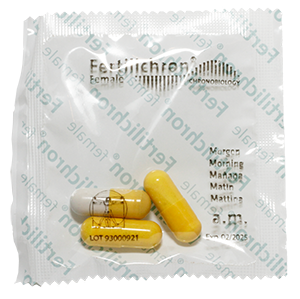 Fertiliplex®
Fertiliplex®
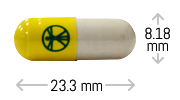 Pregnachron®
Pregnachron®
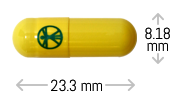
Fertilichron® Female PM
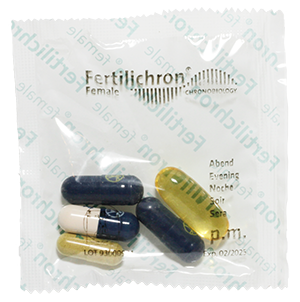 Softgel Omega 3
Softgel Omega 3
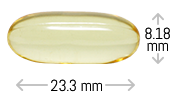 Fertiliplex®
Fertiliplex®
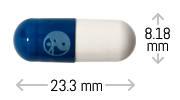 Resverol®
Resverol®
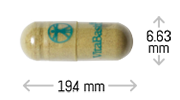 Pregnachron®
Pregnachron®




